Bertagnolli Formally Sworn In, Outlines Agenda
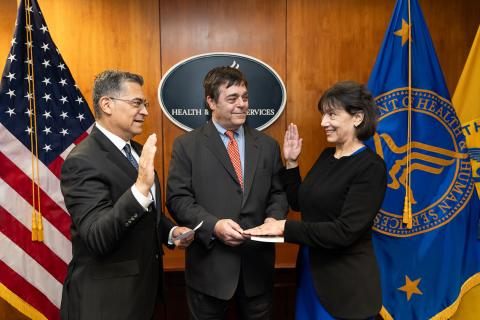
Close to a month after taking the helm, Dr. Monica Bertagnolli was formally sworn in on Dec. 6 as 17th NIH director by Secretary of Health and Human Services Xavier Becerra.
On the same day, she assisted in a surgical procedure at the Clinical Center with a former postdoc in her lab, Dr. Stephanie Goff, now a surgical oncologist at the National Cancer Institute’s Center for Cancer Research, and held her first media briefing virtually, during which she outlined her priorities leading NIH.
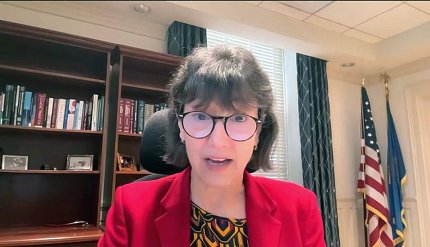
“It is an incredible honor to lead the world’s largest funder of biomedical research,” Bertagnolli said, opening the media session.
“I’ve always admired NIH and all that it does to advance fundamental research and to improve clinical care. Now that I’ve been given this opportunity to serve as director, I believe my experiences and the perspective they have given me will help me in this role.”
Bertagnolli officially began her term as director on Nov. 9, after bipartisan confirmation by the U.S. Senate.
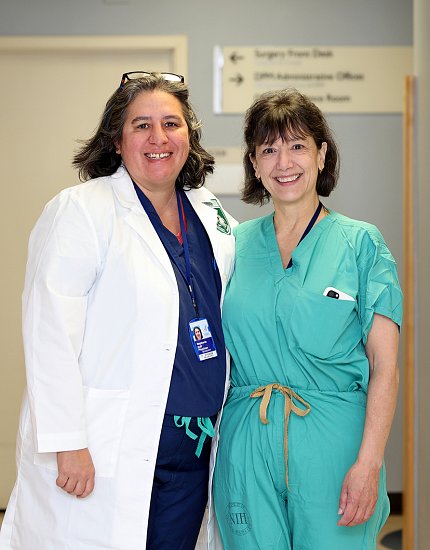
Photo: Chia-Chi Charlie Chang
Recalling her upbringing on a sheep and cattle ranch in central Wyoming, she described contrasts with metropolitan areas such as Boston and Bethesda, where she lived during her medical training and surgery career, and where NIH is headquartered. She recounted her father’s long commute for surgery and radiation after his diagnosis with cancer when she was a youngster, and her own recent breast cancer treatment that was informed at every step by NIH research.
Bertagnolli said as director she intends to draw on such personal insights to do the job, speaking of her husband and their two adult children and mentioning that a son has autism.
“Equity will guide my approach to leading NIH,” she emphasized. “I know by direct experience the transforming power of research to save lives, but I also know that I am a person of privilege. And we need the biomedical research enterprise and its discoveries to be more inclusive and accessible to people from every walk of life.”
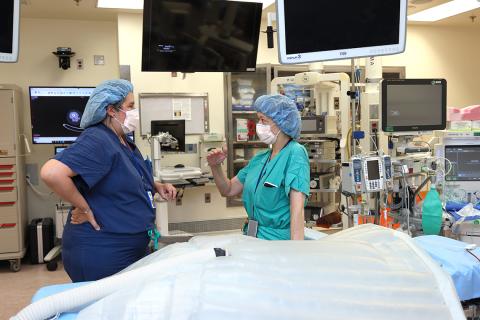
Photo: Chia-Chi Charlie Chang
Several of her goals are clear already, Bertagnolli said, and are likely to stay constant throughout her tenure.
With an unprecedented opportunity to embrace and increase access to innovation, she said she wants “to focus on what NIH can do as a biomedical research institution to ensure that our advances reach the people who need them.”
In addition, she said fundamental science is critical. So much about human biology is learned in basic science laboratories and NIH must be even more effective in linking what we learn to the human experience.
Another aim is to ensure that the biological insights identified in labs are pursued aggressively in ways that speed their application to improve the circumstances of real people.
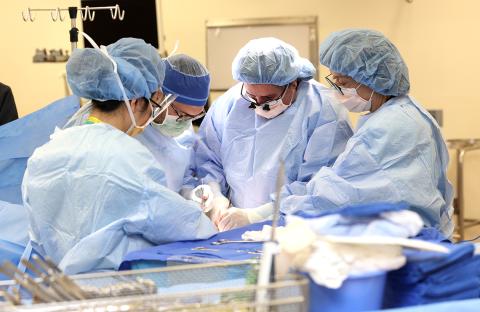
Photo: Chia-Chi Charlie Chang
“This means we need to make sure that our clinical research is also robust and comprehensive and that the results of clinical trials benefit everyone,” Bertagnolli pointed out. “That means making [clinical studies] more efficient, more inclusive and more responsive to the actual needs of patients.”
The new director also wants NIH to concentrate on health care delivery research and implementation science to improve access to care, to best ensure the already available life-saving tools are getting to clinicians and helping patients.
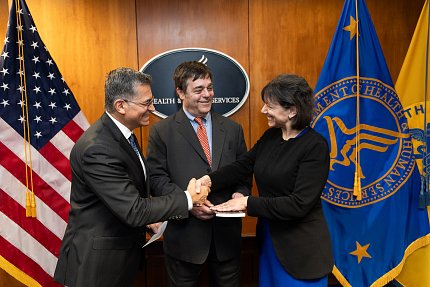
Another Bertagnolli priority involves capitalizing on learning-based analytical tools so data can be harnessed into advances that benefit providers and patients. Artificial intelligence, she observed, is already revolutionizing what is possible for biomedical research and clinical care. NIH needs to invest in secure and sustainable data-sharing infrastructures and in highly sophisticated tools to speed progress.
Finally, she said she intends to be at the forefront to address a concern brought to light by the global pandemic: Encouraging people to believe and rely on science again.
“I aim to do everything that I can to help restore trust in science and achieve equity in access to the benefits that arise from biomedical research,” Bertagnolli concluded. “[That will be a] guiding principle underlying everything that NIH does—the mandate that our job is not done when scientific discoveries are made. Our job is done when all people are living long and healthy lives.”
